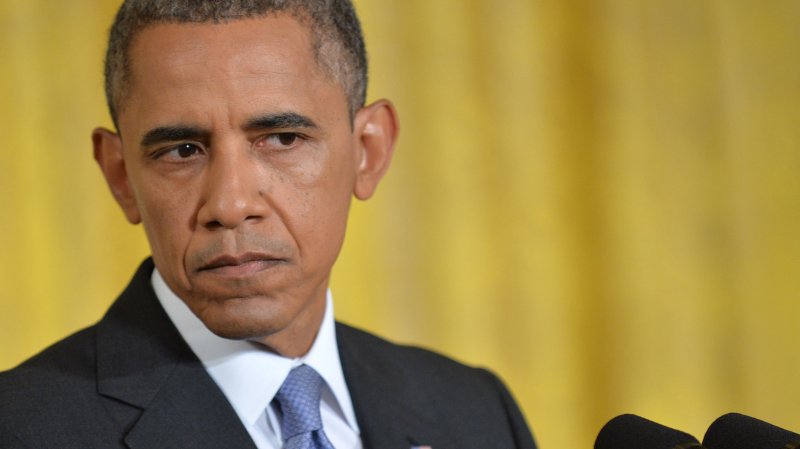President Barack Obama holds a press conference in the East Room at the White House on August 9, 2013 in Washington, D.C. Obama spoke on the U.S. surveillance program and relations with Russia. UPI/Kevin Dietsch |
License Photo
WASHINGTON, Aug. 12 (UPI) -- A White House idea to add a privacy advocate in the secret court overseeing National Security Agency phone-data logging is a mistake, key U.S. Republicans said.
"I don't think that's the right way to go," House Homeland Security Committee Chairman Michael McCaul, R-Texas, told NBC's "Meet the Press."
He was responding to President Obama's suggestion in a news conference Friday U.S. Foreign Intelligence Surveillance Court procedures could be changed "to make sure civil-liberties concerns have an independent voice in appropriate cases by ensuring that the government's position is challenged by an adversary."
Obama said: "One of the concerns that people raise is that a judge reviewing a request from the government to conduct programmatic surveillance only hears one side of the story -- may tilt it too far in favor of security, may not pay enough attention to liberty. And while I've got confidence in the court and I think they've done a fine job, I think we can provide greater assurances that the court is looking at these issues from both perspectives -- security and privacy."
McCaul, a former chief of counter-terrorism and national security for the Texas branch of the U.S. attorney's office, said he feared the civil-liberties voice would hamstring the FISA Court and hold up anti-terrorism efforts.
"Look, I'm in a unique position to talk about this," he told the interview show. "I actually applied for FISA warrants as a counter-terrorism prosecutor, and I think the idea of having a public defender ... would slow down the efficacy and efficiency of our counter-terrorism investigation."
House Intelligence Committee member Peter T. King, R-N.Y., a former House Homeland Security Committee chairman, echoed McCaul's remarks, telling the CBS News program "Face the Nation" he thought "it would be very impractical" in terror-investigation cases, which often require quick decisions.
"We cannot afford to have this become a debating society," King said. "We need decisions made quickly, yes or no, up or down, because lives are at stake."
Conceivably "on some general policy issue where the court is going to make a decision, perhaps, you could bring in an advocate," he said. "But, no, on day to day, life-and-death decisions I believe absolutely not."
King likened the FISA Court to grand jury proceedings, which are also secret.
"There is no adversary lawyer allowed into a grand jury room and ... whether it's drug cases or organized-crime cases, child-pornography cases, the government obtains warrants from judges without advocates being there for the other side," he said.
But Michael Hayden, a former NSA and CIA director, mostly under President George W. Bush, said he thought Obama's suggestion made sense, based on the outlines Obama made.
"There are two kinds of decisions that the court makes," Hayden told "Face the Nation." "One is getting a warrant on an individual person. The other [involves] these broad questions of lawfulness about broad programs.
"I think the president was talking about that and was not talking about getting a public defender in there for Tony Soprano every time you want to go up on a wiretap with him," he said.
A privacy advocate with a more narrowly defined role "may be useful for transparency ... [and] it may be useful for confidence," said Hayden, a retired Air Force general who was Bush's principal deputy director of national intelligence between the NSA and CIA jobs.
Hayden cautioned Obama's idea "runs the danger of looking like bureaucratic layering" when people second-guess government strategies "after the next successful attack," so Washington needs "to be careful about how many processes you put in there."
He added Washington shouldn't "do this at all unless the American people feel comfortable about it."















